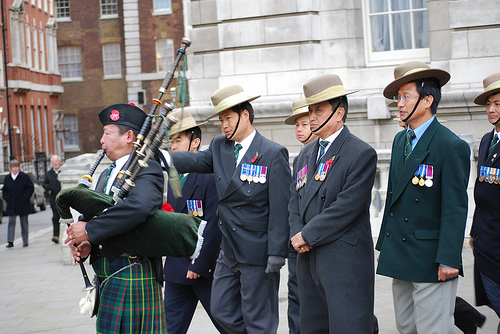The Gurkhas, young men from Nepal who serve in the British military, have served the Queen and the United Kingdom for almost two centuries. Unfortunately, the British government has been less than fair when it comes to honoring their service and sacrifice.
Last week, British press and blogopshere were buzzing about the new government proposal that is prejudiced against the veterans of the Brigade of Gurkhas. Anna Raccoon writes about the proposal:
“To learn that five MPs, who represent the political wing of the IRA, have not even taken up their Parliamentary seats and yet have claimed £500,000 for second homes in the same breath as we are told that we ‘cannot afford’ to allow some 1500 Gurkhas, who have fought in every major theatre of war, from the first Afghan war through to Bosnia, the Falklands and more recently Iraq, on behalf of the British Army, to settle in the UK, and yet we can ‘resettle’ the old ‘soldiers’ of the IRA in London, complete with ‘Samson’ 28-inch wide televisions, and DVD Sony cinemas surround systems, in a £5,400 a month – a month! – house in London.
Truly, the Gurkhas must this morning be wondering whether they were aiming their guns at the wrong soldiers. Gordon Brown used a ‘fabric of falsehood and fantasy’ in claiming that it would cost taxpayers 1.4 billion pounds to let Gurkhas live in Britain, according to campaigners.”
Paul French from Shanghai is “disgusted with the British government's attitude to the Gurkhas”. He voices support for the ongoing campaign by actress Joanna Lumley for the Gurkhas:
“There is a campaign currently running to support Gurkhas and pressure the UK government into giving more help and equal treatment to Gurkhas, called Gurkha Justice that has caught the public’s imagination and widespread support. A motion was voted on in the House of Commons on the 29th April 2009 by the Liberal Democrats that all Gurkhas be offered an equal right of residence in the UK. This resulted in a defeat for the Government by 267 votes to 246, the first, first day motion defeat for a government since 1978. The Commons vote is not binding, but it represents an embarrassment for the government. Yet Phil Woolas, the immigration minister (and, as I well remember a nasty little self-centred careerist when he was head of the National Union Students in my college days – a real horrible little greasy pole climber who obviously hasn't changed one jot) continues to prevaricate and pettifog.”
While the right of Gurkha to settle in Britain and fair pension are the focus of discussion, the issue of race and racism is also being raised. At Spiked Brendan O’Neill writes:
“The Gurkhas have always been treated as second class, as loyal but peculiar, as a race apart, as less intelligent than the white leaders of the British Army but a bit more trustworthy than the everyday wogs of Nepal, Burma and India. Indeed, the Gurkhas have long been an institutional expression of inequality: they were made and sustained, not by British decency, but by British racism.
But not everyone is supporting the Gurkhas. At New Statesman Peter Wilby says that “the Gurkhas are mercenaries” and:
” They don’t fight “for love of Britain and Her Majesty” (to use a soundbite favoured by their supporters), any more than South African cricket mercenaries play for, say, Leicestershire for love of the county’s fox-hunting denizens and rolling countryside.The Gurkha regiment was formed two centuries ago when British troops invaded Nepal but found the fighters too much of a handful and therefore paid them to join our army. A 1947 agreement stated that a Gurkha soldier, if he joined the British army (many joined newly independent India’s army instead), “must be recruited as a Nepali citizen . . . serve as a Nepali citizen and [be] resettled as a Nepali citizen”. They were paid less than British-born soldiers – an obvious attraction to the Ministry of Defence – but the money was high by local standards.”
Some British citizens are voicing their opinion at You Tube too about the Gurkha issue. Here are some voices supporting the Gurkhas:








5 comments
Thankyou Mr Bhumika ji where did u get this all?.
This Whole phenomenon shows that, at last true heart will win.
Jaya Gurkhas!
i am proud to be a gorkha
Gorkhas is the Wariar who born to fight